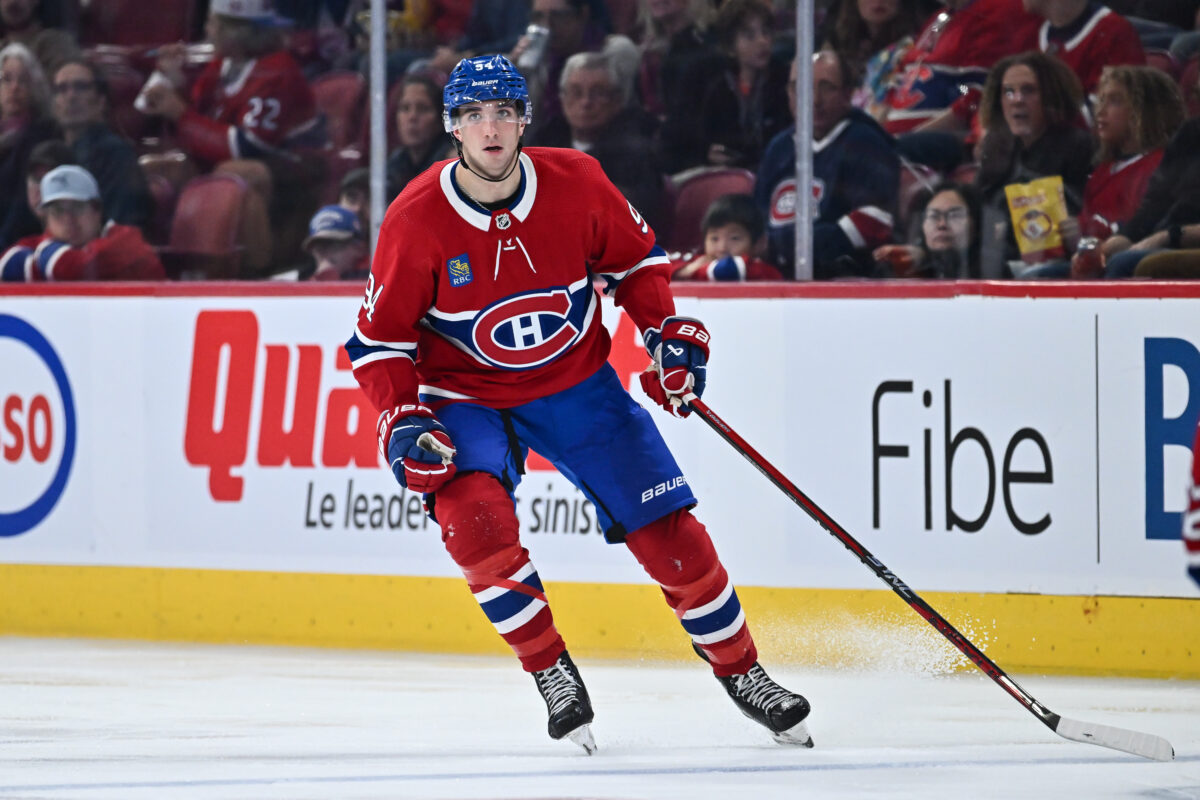Circumstances have changed for the Montreal Canadiens. That could be the understatement of the year after general manager Kent Hughes acquired forward Patrik Laine, thereby significantly shaking up things up front for the Habs. However, with defenseman Jordan Harris going back the other way, the trade has the potential to have a domino effect on the blue line. Logan Mailloux is the likeliest beneficiary, whereas before Hughes had made room, it made sense for him to stay in the American Hockey League.
Related: Canadiens Face No Other Option but to Move Dvorak After Laine Trade
Part of the reason the Laine trade was worthwhile for the Canadiens is how they “only” gave up Harris. While Harris projects as a steady top-four defenseman and holds value, it’s a case of too much supply and too little demand or need, as the Habs had (still have) a surplus of left-handed defensemen, and young left-handed defensemen at that.
No Room for Harris
Harris placed below Mike Matheson and Kaiden Guhle on the depth chart on the left side at least. Matheson may be leaving the organization sooner rather than later as an unrestricted free agent in 2026. However, prospect Lane Hutson is specifically projected to be on the rise on the depth chart on that left side too.
Seeing as everyone has such high hopes for Hutson AND Guhle, who just signed a rich six-year, $33.3 million extension, the best Harris was going to get on the left side were third-pairing minutes (with a fifth-ranked 17:28 per game last season). Then you get into Jayden Struble and Arber Xhekaj.
Struble clearly earned the trust of the team’s coaching staff with 56 games played last season (even effectively enabling the Habs to take their time developing Xhekaj in the AHL after he had returned from injury). With Xhekaj having just signed a one-way extension, competition for ice time was always going to be stiff. In fact, the left-handed Harris played more often on the right than the left, as a result.
So, with Harris’ departure as well as that of Johnathan Kovacevic earlier this offseason, it’s clear there’s now more room on the right. Two spots will presumably go to veteran David Savard and the newly extended Justin Barron, who will realistically get promoted full-time now that he’ll be eligible for waivers for the first time. So, Mailloux, an AHL all star last season as a rookie, likely now has the inside track to make the roster out of training camp.

Harris had been the subject of trade rumours for a while as someone who conceivably didn’t fit, due in large part to the fact the Canadiens played him on his off side. It spoke in part to his versatility, but also to his expendability in the eyes of many.
To be fair, the same is true of Guhle, who played the most often opposite Matheson, on the top pairing. Obviously, Guhle playing as much as he did (20:51, just below Matheson, who had the highest ice time among Canadiens defensemen) shows the degree to which the Habs value him, though. Ultimately, the goal should be to play Guhle on his natural side as much as possible for the sake of his development. Moving Harris accomplishes that too, because of the natural pairings it establishes.
A Spot for Mailloux on Third Pairing?
Matheson is a natural fit alongside the stay-at-home Savard on the top pairing. Guhle and the offensively inclined Barron, Guhle’s second-most-common partner last season, complement each another in principle. Assuming Struble and Xhekaj battle it out for seventh-defensemen duties, that leaves a spot on the right for Mailloux… or David Reinbacher (or Adam Engstrom).
While Reinbacher, the Canadiens’ fifth-overall pick in 2023, is gunning for a roster spot himself, Mailloux should be the favourite… not necessarily because he projects as the better player. Ultimately, he just fits better based on current circumstances.
Whether it’s Xhekaj or Struble on the left, Mailloux’s offense complements them better than Reinbacher’s defense. Meanwhile, should Barron falter, they can move up and down between the second and third pairings almost interchangeably on paper (based on their offensive capabilities). Barron and Mailloux meanwhile give the Habs two right-handed shots from the blue line for separate power-play units, if they choose to go that route.
Obviously, the Canadiens must hope Reinbacher develops more of an offensive game (and Mailloux more of a defensive one to be fair). However, there is probably more opportunity for Reinbacher to hone his skills at his own pace with the Laval Rocket than with the Habs. Based on his higher projected ceiling and low overall expectations for the team in the standings (relatively speaking), there should be no desire to rush him in any way.
The general consensus is the Canadiens drafted Reinbacher to be a top-pairing defenseman. Ignoring his and Hutson’s complementary styles for the moment, it’s fair to argue they envision Guhle developing into much the same on the opposite side because of the extension he just signed. Guhle only debuted two seasons after being drafted at Age 20.5. If the Habs are going to take a similar approach with Reinbacher, he’s got a year of development at a lower level awaiting him.
With Mailloux now 21, his time could realistically be now.
